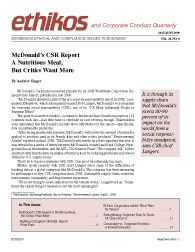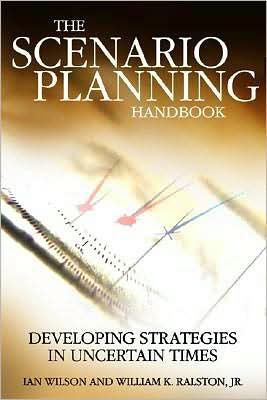| Quick Links |
|
Upcoming Events
Web Seminars
DECEMBER 16
The Lukaszewski Group
100 South Bedford Road,
Suite 340
Mount Kisco, NY 10549
914.681.0000-Office
914.681.0047-Fax
|
| Products
So You Want to Tell the Boss What to Do? |

Crisis Communication Plan
Components & Models
Becoming a Verbal Visionary
How to Develop the Mind of a Strategist
Ingredients of Leadership
Visit our Crisis Store for More Lukaszewski Products
|
| Jim's Suggested List of Management Reading |
|
Scenarios: The Art of Strategic Conversation
|
|
Crisis Guru Blog
This is a blog for the curious, the strategic, the articulate, and the argumentative looking for sensible, interesting, constructive discussions. |
| Excellent Collateral Resources |
Phil Rothstein is one of the great publishers and information gatherers in the field of crisis communications, business continuation and resumption, and business resilience. This is an E-mail you're going to want to examine whenever it comes out. It's always jammed with stuff that you rarely see elsewhere.
Ethikos

If you have compliance responsibilities or your organization has them, this is a must read, every issue. It's real time, it's really authoritative, and it's understandable and useful.
This ezine, launched in February 2000, covers everything from crisis case histories to book reviews, from analyses of current breaking crises to pithy editorials on the state of crisis management today. | |
|
Executive Action
Strategic Crisis Management Insights for
Decision Makers and Their Trusted Advisors
November 17, 2009
Number 5
|
|
Note to Readers
Hello everyone.
A small favor: If this eNewsletter seems valuable to you, let me ask each of you to send me the names and E-mail addresses of five-to-10 colleagues who might also benefit from receiving it. That way I have an excuse to add them to my list of recipients. Please let them know what you're doing, or simply ask people to drop by my Web site, www.e911.com, and leave their E-mail address if they would like to receive it. For every five E-mails you send me, I'll send you one of my CDs (up to a maximum of three, because that's all I have produced at the present time). As always, we protect your privacy and unsubscribing is a simple one-step process. New features and those you've come to expect are present in this issue, plus an editorial: This edition contains three really interesting major topics and a handful of other curiosities for you:
Crisis Guru Commentaries:
As always, your comments, questions, suggestions, debate, disagreements, and challenges are welcome.
 James E. Lukaszewski, ABC, APR, Fellow PRSA
|
|
 Strengthening Corporate Trust in Times of Crisis, Part I Strengthening Corporate Trust in Times of Crisis, Part I
This is a major case study of a tragic trust-busting scenario. It demonstrates the all too prevalent pattern of initial leader behaviors that generate more adverse results and more serious ethical lapses. In addition to an interesting right way-wrong way analysis, Part II of the article factors in community expectations when serious ethical and operational lapses occur. Click here to read more about Rebuilding Corporate Trust in Times of Crisis.
|
|
 Strengthening Corporate Trust in Times of Crisis, Part 2 Strengthening Corporate Trust in Times of Crisis, Part 2 |
|
 Gosseen's Legal Believe It or Not . . . Gosseen's Legal Believe It or Not . . . Statements Actually Made by Job Applicants
Q: Why did you leave your last job?
A: "I have a problem with authority."
Q: Tell us about a problem you had with a co-worker and how you resolved it.
A: "The resolution was we were both fired."
Q: Do you have any questions?
A: "Cross dressing isn't a problem is it?"
Q: What are your assests (as in strengths)?
A: "Well, I do own a bike?"
Q: What are your weaknesses?
A: "I get angry easily and went to jail for domestic violence. But I won't get mad at you."
Q: Is there anything else I should know about you?
A: "You should probably know I mud wrestle on the weekends?"
Q: When can you start?
A: "I need to check with my mom."
Q: Describe a time you made a mistake and how you dealt with it.
A: "I stole some equipment from my old job, and I had to pay for its replacement."
Q: Have you submitted your two weeks' notice to your current employer?
A: "What is two weeks notice? I've never quit a job before, I've always been fired."
|
|
 Apology Watch Apology Watch
Only in Canada Do Newspapers Apologize
Here is one for Ripley's Believe It or Not, a newspaper actually apologizes for inventing a scandal:
www.nytimes.com/2009/08/03/business/media/03paper.html?partner=rss&emc=rss.
The Saint John Telegraph-Journal in Newfoundland thought it had a big story when the Prime Minster of Canada Stephen Harper took communion, but apparently failed to put the communion wafer in his mouth. This is a story, brief though it is, that you need to review for its entertainment value and its rarity, since after pummeling Prime Minster Harper with allegations for months, the Telegraph-Journal finally admitted it had invented the affair.
|
|
 On the Blog On the Blog
What Are the Attributes of the Ethical Executive?
For some time now, I've been conducting my own completely unscientific "poll" of senior advisors, asking them, from their experience, to provide up to 10 attributes of executives with integrity. The question I asked was, "What are the characteristics, behaviors, and attitudes of the ethical executive?" I asked each individual for 10 examples.
|
|
 Editorial: Will Business People Ever Have Integrity Again? Editorial: Will Business People Ever Have Integrity Again?
You are reading this editorial, hopefully, because in the back of your mind you hope the answer is "yes?" Well, that is my hope too, but every day that passes makes it less likely. The reason is bizarre: 30 years of relentless business school-driven amoral, totally competitive, and greed-driven management education. There is very little evidence to demonstrate that business people and businesses got the message the rest of us received from the enormous pain and suffering unleashed on October 15, 2008.
Some years ago, I was asked by a crisis expert to co-write a book about managing global crises. The project fell apart because, at the time, we couldn't think of a global problem sufficient enough to write a crisis management book about. Since that time, H1N1 and the global greed guys--insurance companies, banking, Wall Street (and one or two other stock markets), real estate, and the credit industries--have now defined for us the specifics of a truly global crisis. And, true to form, these doughboys are already receiving and looking for huge bonuses while the rest of us scramble for a mortgage, a job, a way forward.
Since the scope of the devastation from last October is so dramatic and so pervasive, one would think that with millions of victims, most of whom will suffer (more or less) for the rest of their lives, that there would be an attempt to moderate the greedy, rapacious nature of businesses and the teachings of business schools. Short of a serious number of CEOs going to prison, neither business schools nor their graduates have much to worry about.
That leaves you and me to head up the Integrity Squad. And, actually, that makes a whole lot of sense, because companies and institutions can't have integrity. Only the people that work with, in, and lead these organizations can have integrity, or not. It is like the fallacy of corporate culture and the nonsense in business schools about shaping corporate culture. Corporate culture is the combination of the cultures brought into an organization by those who work there and who are directly tied to the organization.
What is missing, of course, are strong openly ethical leaders, strong role models, business persons of solid moral character who take on this role with credibility as well as integrity. In the meantime, while we wait for this messiah to materialize, a lot of efforts are underway and a lot of ethical jawboning is occurring, again, largely by business schools trying to rack up points in the "I talk more ethics than you" competition.
Keep your eyes on the bankers, the insurance industry, the real estate folks, Wall Street, and the credit industry, America's bonus--happy boys and girls. These folks not only successfully defend against significant or serious regulations and oversight, they are learning how to defeat those measures that are being put in place. If you think back about this last catastrophe, the very folks who caused it were among those folks who were called upon to resolve it, because . . . who else are we going to call?
An old friend of mine (a former head of security at a Fortune 500 company and an FBI agent for 10 years or so), told me one time that if you really want to be a successful criminal, you gotta steal big. Stealing big keeps you in control of your destiny, because they (society) have to give you a foot outside the jailhouse door, all of the time, on the chance that recovery will occur as well as, perhaps, a serious apology or admission. Perhaps we can agree that the events leading up to October 15, 2008 were the quintessential strategy of "stealing big." But remember that those in charge of solving the problem today are the ones who will benefit most and find their way through to profit from the next debacle when it occurs, which will be in approximately half of the time that it took for this one to develop (October 13, 1987 to October 15, 2008-about a generation). Look for the next one, absent some significant change in the business management and regulation strategy in this country, to occur in only 10 years. Absent any substantive regulatory reform, the countdown clock has already started running.
I have an idea. How about an annual ranking of business schools, selected by the number of felons they have produced? Business Week Magazine actually published such a list very briefly. The list appeared in the magazine and on the magazine's Web site, but was taken down within a few hours or days of its posting. You can imagine the flack that list generated.
|
|
 Jim's Wisdom Jim's Wisdom
Brief Observations or Insights About Leadership and Guiding Leaders
Cooking Up Bad Communications
Bad communications, especially from the highest level of organizations, fits a depressingly recurring pattern. When top managers are faced with difficult decisions, surprises, negative news, embarrassment, humiliation, irritation, or indictment, and personal failure, there is a set of behaviors they've learned-handed down from manager to manager-that will only get them in deeper trouble. Here are the behaviors that, I guarantee, will make any problem worse:
- Remain silent (the most toxic strategy of all)
- Duck the issues (even those in your base audience will quickly question what you may be hiding by refusing to face situations directly)
- Avoid answering questions (answers are the most powerful tool for settling people down and helping them quit caring about you)
- Blame the accuser (discrediting accusers is the beginning of a leadership suicide strategy)
- Blame the victims (a strategy that's likely to cause very senior people their own career-defining moments)
- Send the lawyers out first (lawyers aren't trained for peace or empathy, they're trained for war; let them speak and war will commence)
- Minimize the import and the impact (ignoring someone's pain and suffering causes outrage)
- Take it out on employees (a sure fire way to create critics and enemies inside your organization, all focused against you)
- Make an enemies list (once you make an enemy, they will always be your enemy)
- Whine about how unfair life is to you after all you've accomplished on behalf of so many others-and yourself, most of all (whining is the strategy of perpetrators, everyone notices)
If any of these behaviors are a part of your serious situation response strategy, I suggest you hop on my Web site, www.e911.com, and download the one-page document called "Seeking Forgiveness." You're going to need it.
Top of Page |
 Jim's Critical Management Book Reading Recommendations Jim's Critical Management Book Reading Recommendations
|
 Public Relations: Public Relations:
A Primer for  Business Executives
By Robert J. Petrausch, Donald Grunewald, and Giri Dua
IUniverse
(November 25, 2008)
Dr. Robert J. Petrausch (Ed.D Columbia), Dr. Donald Grunewald ( DBA Harvard), and Dr. Giri Dua ( DBA, CSM-IGS) have written a hands-on book of ideas, resources, and practical suggestions for making public relations work in your organization. It can be purchased on www.Amazon.com or www.BN.com. |
Scenarios Are a Key Strategic Tool
There have been a couple of articles recently about the importance of scenario-based business planning and crisis response planning. I've included three of my favorite scenario planning books in my recommendations this time. |
 Serious Play: Serious Play:How the World's Best Companies Simulate to Innovate
By Michael Schrage
Harvard Business School Press
First Edition
(December 1999)
This is a very cool and intricate book by someone who is getting a lot of attention for his innovative thinking and his reliance on scenario development as a gateway to innovation in organizations. For my money, it is increasing validation with the notion that practice makes perfect, saves money, and often delivers very powerful new ideas along the way.
|
 Scenarios: Scenarios:
The Art of Strategic Conversation 
By Kees van der Heijden
Wiley
Second Edition
(January 18, 2005)
This book is about the strategic nature of scenarios, which are, by definition, strategic illustrations, stories, or conversations. It is a useful read simply because the work of the author is recognized, even today, as seminal and original, and was gained in a laboratory of controversy, contention, and conflict, Shell Oil.
|
 The Scenario Planning Handbook: The Scenario Planning Handbook:
Developing Strategies in Uncertain Times
By Ian Wilson
South-Western Educational Pub
First Edition
(June 9, 2006)
Describes his work as energizing management, enhancing corporate perception, and crucial ingredients to developing leaders. This is a very practical book about where scenarios come from, how to get management support, and designing, developing, and carrying out scenarios as key concepts in developing and identifying future options for organizations. The author calls it a handbook and it truly is.
| |
|
|
|